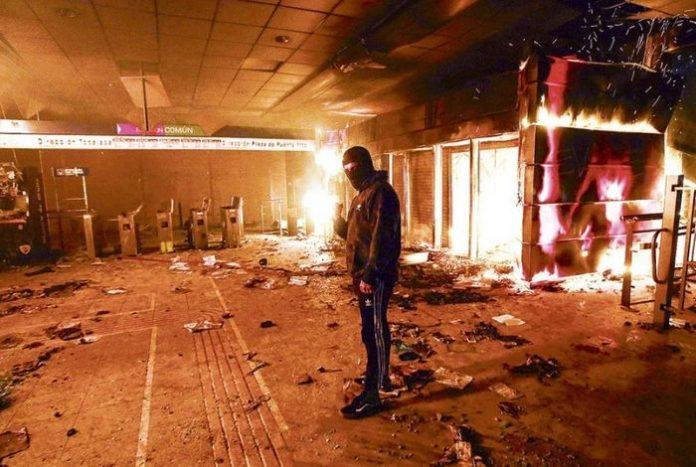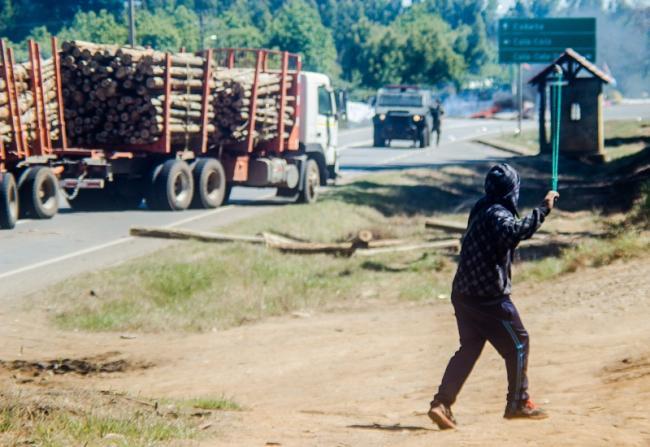Chile: Interview with the band La Lira Libertaria
Interview between the band La Lira Libertaria in Chile and JURNAL ANARKI in Indonesia.
1. What motivates you in creating this band? The song “Armate” feels like a homage to the memory of insurrectionary Mauricio Morales, how do you elaborate your music and band with anarchist revolt?
The band was formed to show political solidarity and fill the spaces that we frequented around 2009 and a little before: squat houses and social centers mainly. At first the Lira was a paper piece of popular poetry that we printed that year and that rescues the tradition of the popular poets of the late 19th century and early 20th century, but with anarchist content. The formation as a musical band began later around 2010 in the context of the “Bombs Case” and sought to contribute to the spaces that were hit. The song Ármate is undoubtedly a tribute to the comrade Mauricio Morales Duarte who fell in action on May 22, 2009. The lyrics are an adaptation of one of his poems, and the girl who sings it with us was his partner, which is little known. We wrote it for the second commemoration of his death, and we presented it at the now defunct “Cueto con Andes” social center, where Punky Mauri himself visited and contributed to. Some time later, comrade Luisa Toledo would make her words even more well-known: beautifully violent. Sometimes people confuse this and think that they are words from our dear grandmother Luisa, but she took them because it was her favorite song by the band. That way, the songs and its stories are directly related to our recent political processes, and to the revolt and resistance against the neoliberal model in Chile.
2. From our informal discussion in the past you hinted that most of you come from the specific tendency of combative anarchy, can you tell us more about this?
Yes, we all met at the time we were studying, around 2006 onwards, and we were part of the riots and street-based struggles, like so many young people in Santiago. That is why we lived through the processes of the student rebellions of those years and the protests for the release of political prisoners, environmental projects, the denunciation of capitalist democracy and the anarchist movement.
The insurrectional anarchist movement was constantly attacking the system in that decade and even later, when the band was already formed. That’s what our songs are about, that’s why in them there are stories of attack, escape, prison and joyful rebellion too. The band grew up with this marginal discourse, and with the October 2019 revolt it achieved greater notoriety, since it had been talking about the contradictions of the capitalist model for a long time.

3. People from non-latin speaking countries are amazed by the growing anarchist tension in Chile, especially the diverse anarchic movement, the regeneration of the youth, and the especially heavy repression that the anarchists faced amidst all of this yet still retain their combative and insurrectionary action – what’s really making all of this possible?
As I see it, the commitment to the struggle is explained since it is part of generations and generations of combatants, since the times of dictatorship (1973-1990) and even before. It is linked to our families, to our disappeared detainees, and to the indigenous culture itself, which tells us that the Mapuche tirelessly resisted the Spanish.
In that political environment we grow. This is even stronger considering that democracy stained its hands with the blood of the fighters against the dictatorship, and imprisoned those who continued fighting against capitalism. Figures like Claudia López, murdered in the commemoration of the coup d’état in 1998, and so many other Chilean and Mapuche young people, this fueled since childhood our desire to fight, our desire for freedom and our love for our compañeros.
Perhaps that is the most important component, and what explains everything: the love of the struggle and the memory of the comrades who fell fighting and those who still fight to this day. That is why anarchists, despite being beaten time and time again, maintain their action, because it is also a way of carrying within us our beloved compañeros who were taken from us.
4. In Chile there’s events such the “Day of the Young Combatant” which keeps in our memories those who fell in the struggle; how much of this commemoration for the fallen combatants influences society?
I recently read that Chile is a country of extremes. So there is a sector of society that criminalizes events such as the Day of the Young Combatant, very much as the press and television does. However, it is a very, very important part of our political culture. For decades Luisa Toledo and Manuel Vergara raised this day, March 29, in memory of their sons murdered by the dictatorship, Eduardo and Rafael, in 1985, and to whom we pay tribute in our song “7 and 10”. For decades it was part of the two main combative commemorations, along with September 11, the day of the coup d’état, days in which the riots took over the city, for us it was with great beauty.
Unfortunately the list of young people killed and fallen in the struggle has increased over the years, so the date increasingly includes the names of these companions. March 29 is a fundamental pillar of our memory, and with the death of Luisa, our beloved grandmother, it has gone down in social history in a way that has no limits.
More than once we shared that day with Luisa and Manuel, in squares, streets, visiting the students in their schools, singing and spreading the story of the Vergara brothers. In all those years it is impossible to know how many rebellious hearts were touched.
5. In “nomalizing” combative action Chileans are most likely prepared whenever there’s going to be general upheaval, how is the so-called movement into these diversities of tactics? Are there any debates or even subdivisions concerning this?
It is difficult to talk about these things and do an extensive analysis. I think that social networks tend to mystify what happens here in Chile, and increase the image that we project to the outside, without taking away credit from what does happen. The diversity of tactics has been going on for decades, and can be explained since the fight against dictatorship did not happen too long ago. As children we grew up looking with admiration at the fight of the old guerrillas, and we always took them as an example to follow, but from an anarchist perspective. Then anarchy in Chile took a lot from the example in Greece, the of the Conspiracy of Cells of Fire, and informal anarchism inspired us with its tactics and internationalist solidarity as well.
I think the failure of the 2019 revolt showed that we were really not that prepared for a general uprising. Yes, we shook the institutions, the people demonstrated their strength, but we could not overthrow the government, and finally the people fell into the old lie of voting. We are currently still analyzing that. The revolt united many, reunited others, and left us defeats, but also lessons.

6. Can you tell us how much sympathy Chilean society has to the indigenous Mapuche struggle for autonomy? And what do anarchists contribute to the struggle?
As I say, Chile is a country of extremes. Thus, there is a part of the population that considers the Mapuche struggle as terrorist violence. However, another important part of the population identifies with it. We have to consider that we are part of an indigenous culture that has always resisted, and that is to a certain extent part of the national pride. Governments for decades and decades have been in charge of whitening our culture, since the Spanish invasion, always looking towards Europe, but it is impossible to deny our roots.
Mapuche society is rather closed in on itself, it does not usually accept foreign examples. Perhaps that is why the Mapuche and anarchist struggles are not more united despite having a common enemy: the State and authority. In any case, anarchism does have meeting points with the Mapuche, and supports their liberation processes. We could say that we are political neighbors, who get together regularly, and currently they are practically the only two forces that oppose capitalist society.
X: Please give your opinions or whatever you wanted to say that has not being asked in this short interview, there’s no limitation.
Sometimes our colleagues, knowing that we are anarchists, forget that our project is about music. In that way, it is not known if we are musician-anarchists or anarchists who make music (I laugh). I don’t know if we are one thing or the other. However, we continue making music, telling the stories of struggle that have recently taken us to Argentina and Colombia, uniting with compañeros from other latitudes beyond Chile, which is beautiful.
At some point the stories that came to us from Indonesia also fed our hearts and gave us strength in difficult times. We are very grateful to be able to bring these words to you, because in them is the memory of our brothers and sisters: Mauricio Morales, Luisa Toledo, Sebastián Oversluij, among many more.
We send you a big rebel hug from this side of Abya Yala. Let’s continue weaving networks and bringing together the rebels of the world! Waiting for the tour to Indonesia! Love and anarchy!
